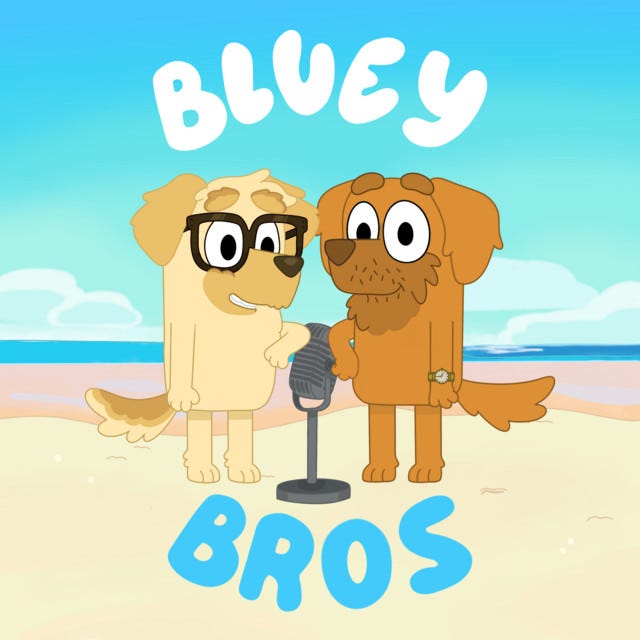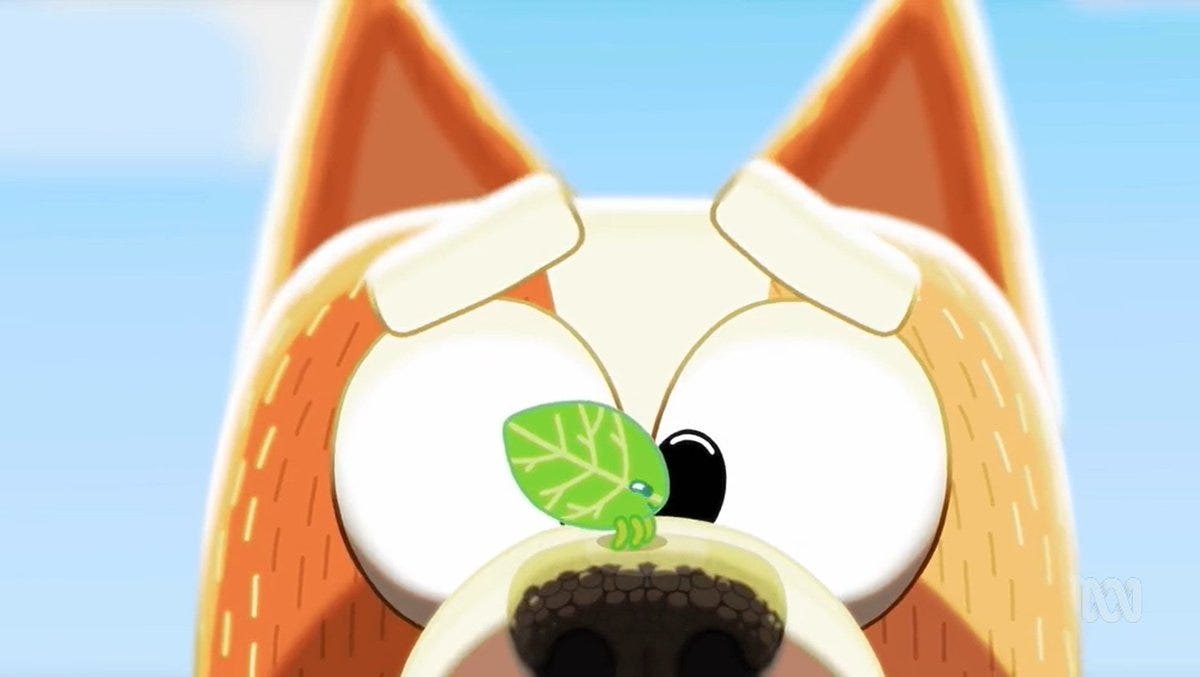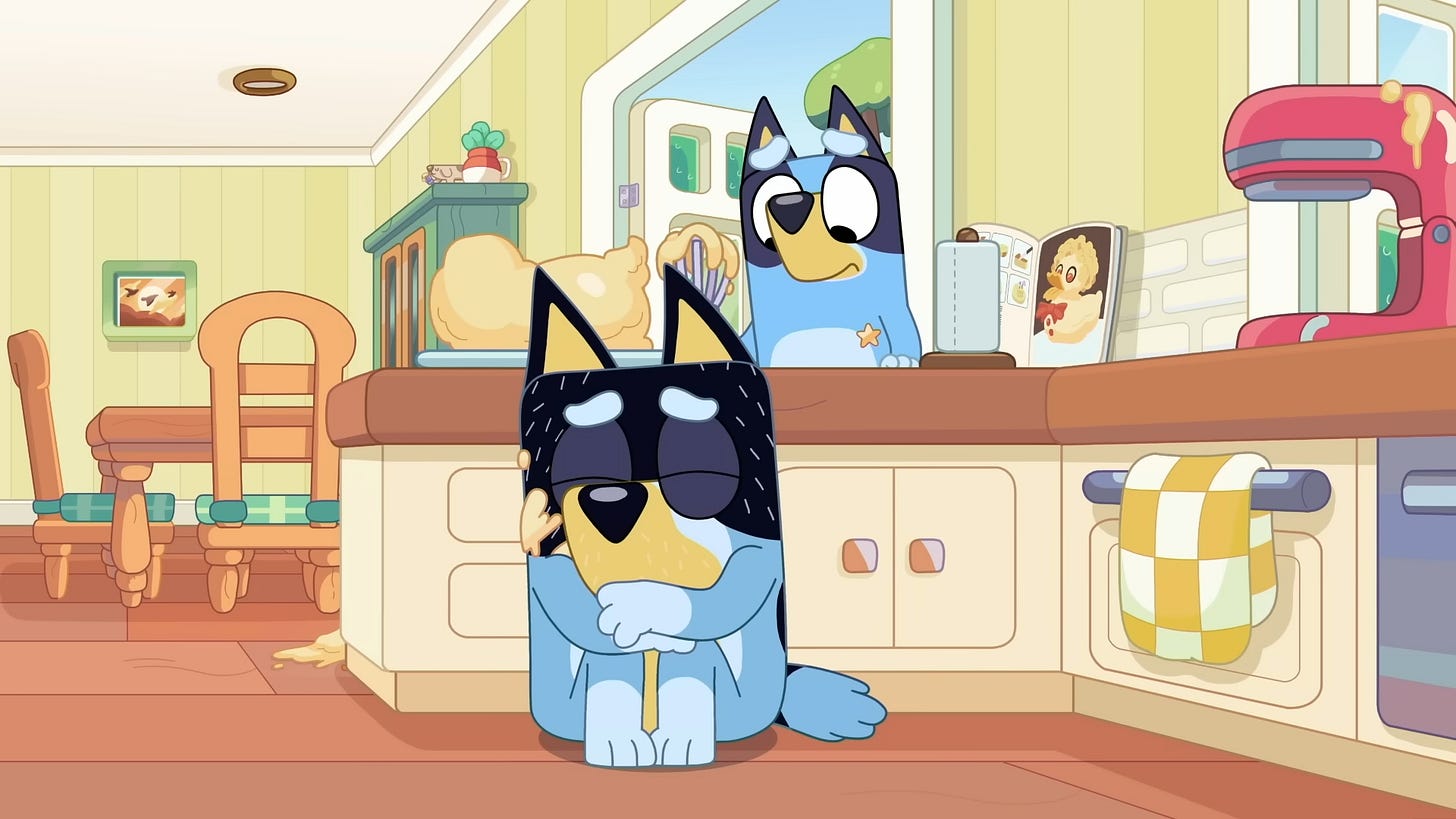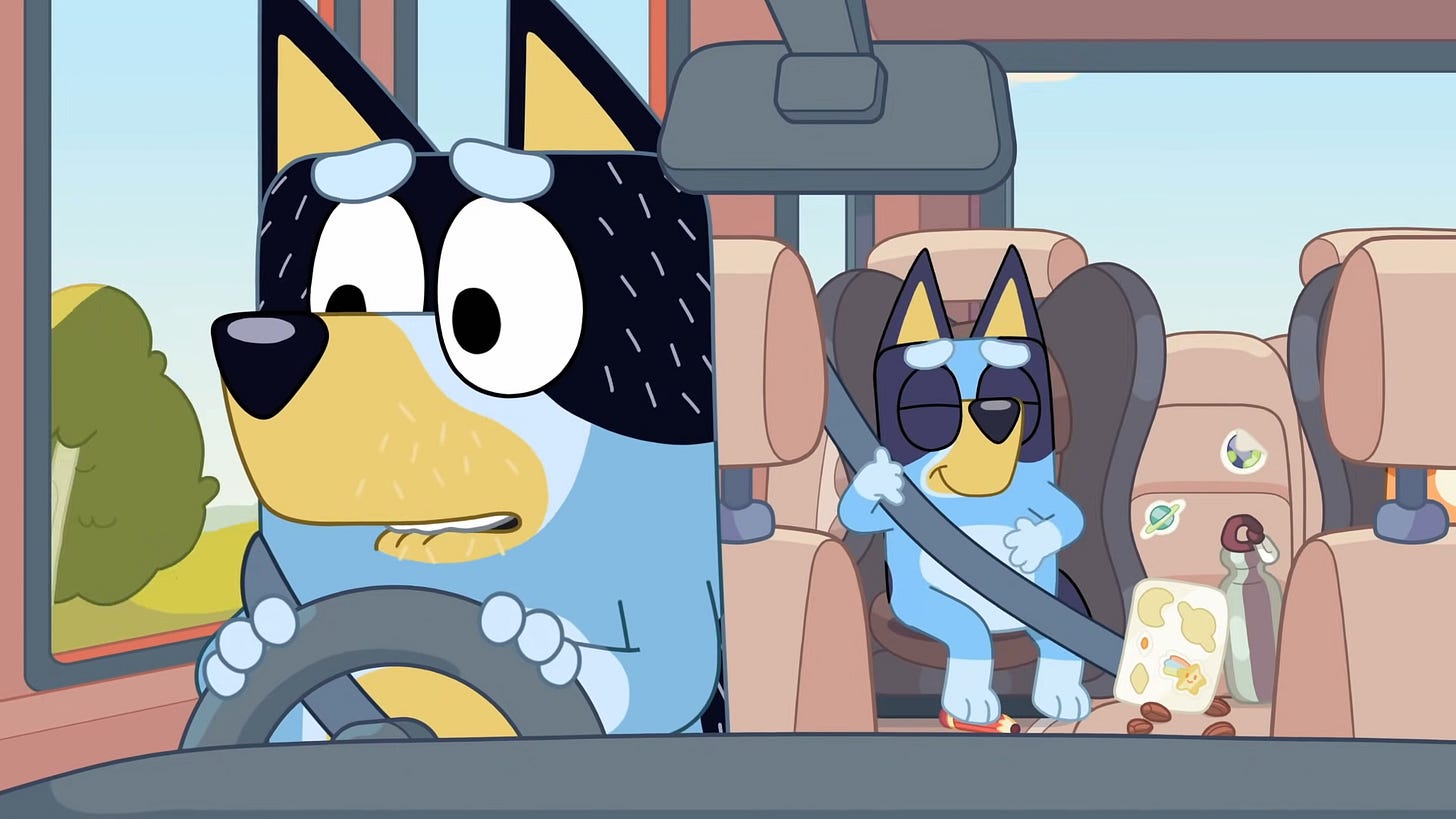This week, I published an essay on my beloved Bluey at Bright Wall/Dark Room. As part of that essay, I talked to parents and Bluey enthusiasts of many stripes, and over at this newsletter for the remainder of the week, I thought I’d bring you the unedited versions of a couple of those conversations. Today, I’m sharing my conversation with Cory Wright-Maley and Tim Harvie, professors at St. Mary’s University in Calgary and hosts of the podcast Bluey Bros. You can read our conversation below, and find Bluey Bros wherever you get your podcasts.
Note: This conversation has been lightly edited for style and clarity
Let's start with Cory. How did you come to discover Bluey?
Cory: I came to discover it in much the same way many parents do, which was just looking for a show that would appeal to all of my kids. At that time, I had a nine-year-old, a seven-year-old, and an about-to-turn-four-year-old–they're now two years older each–and trying to find something that appeals to all of those ages is really difficult. There's a lot of fighting over finding a show. Either it's too scary, or it's too boring. And we stumbled upon Bluey. I think we were just going through Disney+ looking for something new, and found it, and the kids really liked it. It was really funny. For the most part, I wasn't paying attention that closely. They were watching, I was scrolling on my phone. But it got to the “Take Away” episode, and I realized, Oh man, this is about me. This is my life. And I was hooked. So I was glad that the kids liked it, but I was also getting something out of it.
Tim, same question: how did you come to the show?
Tim: Again, it was a couple of years ago, and I don't recall if it was like a word of mouth thing, but it was before it really blew up and was a part of the zeitgeist. It was just a Saturday morning, and I think, again, we were just scrolling through Disney+ looking for something new for our little one, and we turned it on, and my daughter was watching it, and my wife and I were having our morning coffee. For us it was the “Doctor” episode where I just found that I was laughing as much as my kid. And then after that, it was the “Creek” episode where I was like, This show is actually doing something very special, something really kind of profound and different.
Cory, back to you–your specialty is in education. How has that informed your perspective on the show?
Cory: Well, I've taught elementary social studies education for quite some time. And part of what's coming up frequently in the show is how to deal with emotions, how to deal with social situations. And in early elementary social studies, a lot of the teaching is around family and society, and how do we solve problems that come up? And [Bluey] touches on a lot of the foundations of education, so it's been resonant in that sense. There's several episodes that focus on [Bluey’s teacher] Calypso in a school setting. And you see pedagogy that is really actually very good pedagogy, but quite different than what we think of in a typical classroom setup. And so it gives an opportunity for me to think about, but also, potentially, for students to think about–Oh, what's happening here? How do we figure out why this is displayed in the way it is? So it gives me a chance to look with fresh eyes at some things that I've taken for granted as ed foundations, because I've been teaching about it and learning about it for decades now.
Tim, your background is in philosophy and religion. I would love to hear how that has informed your watching the show.
Tim: I've done a lot of work with what's called intersubjectivity, and the mutual and reciprocal encounters of a shared space between two beings. And I do a lot of work with animal and environmental ethics as well. And in the show, there's these moments where you have genuine encounters, whether it's Bingo with the leaf bug–all of a sudden, they animated it differently, the lighting shifts, the music shifts.
Or with with Bluey and the Wallaby [in “The Creek”]. I realized that they're really creating these special moments that aren't packed with energy, the action actually slows down. And I found that my little one was quite entranced with it. And then she started talking to me–when we go for a walk in the park, she bends down and picks up a leaf, and now she's pointing out all the little veins and everything. The slowing down and the being exposed to one another really drew me in. And then from the religion side, one of the first things that really caught me is the episode [“Bumpy and the Wise Old Wolf Hound”] where Bingo’s in the hospital, and they're doing the magic purple pants game. That's actually just kind of a fun version of a little parable that the Dalai Lama tells in his dialogues with Archbishop Desmond Tutu.
And so they're actually drawing on these resources to try and communicate something worthwhile for folks. And I just found that really interesting because they're doing it in a way that draws both parents and little kids in, and all of a sudden we're talking about it. And I just found it really rich.
Tough question to approach, but take it however you want: what do you see as the secret formula that makes this a global phenomenon, not just a cute show?
Tim: Well for me, it's how they go back and forth between episodes that are just insane, crazy fun, where they're obviously just playing for the laugh, and it shows parents just being silly with their kids. The phrase that I've often used [on Bluey Bros] is parents entering into their kids’ world, setting aside the way we like to portray ourselves and entering into silliness. I find that really special and freeing, and I think parents can see that, and then feel free themselves. But at the same time, they don't shy away from the challenges of being a parent, or just being an adult. They deal with things that are really tough, like Chilli comparing herself to other moms in “Baby Race.” I remember when our little one was born, feeding was very challenging for the first while. It was really, really hard. And I remember seeing the implicit, and sometimes explicit, judgment my wife was receiving even from medical professionals. And so they're tapping into something here that's really kind of the heart of parenting, but also the heart of being a kid and being free. And to me, that's something quite special.
Cory: Yeah, and I think there's a kind of tension here between displaying or playing out the challenges of parenting–a lot of that goes over kids’ heads, but I think this is why it's so resonant. But also, there's so many articles out there about parents feeling badly about themselves as a result of Bluey. And I think that tension is wanting always to be a better parent than we are. There's no perfect parent. We all screw up. Sometimes–a lot of times–it feels like all the time. And so watching [episodes] wrap up so nicely is both something to aspire to, but also something that lives in us, in our sense of, I would like to be more like that. But I'm not like that. So in some ways, Bluey has improved my parenting, has made me engage in different ways with my kids. At the same time, it's also made me recognize where I haven't lived up to my own ideals as a parent. So I think that tension holds parents’ attention fixed. And on the kids’ side of things, I think it's the silliness, I think it's recognizing their parents in it and maybe recognizing a more ideal parent than the parents they have. But also the play and the silliness that comes out. That's just pure entertainment.
You used the term “ideal parent,” which I think is relevant to some of the criticism you mentioned–people saying that the show presents an impossible standard of parenting. Do you think it is an impossible standard, or are Bandit and Chilli something we could reach towards?
Cory: Well the idealized standard of whatever framing that we're using, whether that's parent, or husband, or professor, or anything, is in some ways impossible because it doesn't embody the fallibility of people. And so I have trouble with that criticism, because the ideal or the utopian notion of parenthood is impossible to achieve, and yet gives us a marker to strive for. And so I think that despite the fact that it's impossible to achieve–it's certainly not possible for me to achieve–nevertheless, the steps that I'm taking to be a better parent, or the lessons I'm drawing from Bluey, take me a few steps forward. And for me, that feels good enough.
Tim: There's two things that come to my mind when we're talking about this criticism. One is that the show's aspirational in a way, right? Kids aren't ideal humans, they're not going to be perfect and fully engaged all the time, like Bingo and Bluey are often fully engaged. So there's an aspirational element, which I think mitigates against this, Oh, I'm not measuring up, if we kind of recognize that it's aspirational. And then there's the other element where you actually see Bandit screw up. There's a moment in the “Duck Cake” episode where he's failing miserably, and he collapses. He just collapses on the ground. He feels like a failure.
And then when Bingo comes in and sees the cake, she loves it. And he's like, You do? And I think it's just kind of a reminder that our kids’ hopes for us aren’t the standard we hold ourselves to. They're much more interested in us being present, and caring, and invested. And so they're not interested in an ideal standard–little kids have no conception of that, really. They just want the relationship. And for me, that's a helpful reminder, especially when you see the parents make mistakes, you see them apologize to their kids, you see them revisit their own actions at times, and then the family moves on. And I think that's important to remember, that I'm gonna mess up as a parent. But if I can just be honest with that, and then even ask forgiveness from my five-year-old, and then the family can move on in the same way that I forgive my five-year-old when she does something and we move on.
So there's a couple of episodes that I call the “Daddy” episodes, which are “Daddy Putdown” and “Daddy Dropoff.” In “Daddy Putdown,” Chilli has to go to a baby shower, and so Bandit has to put the girls to bed, and that really stresses the girls out. They just can't handle the idea of Dad putting them to bed when Mum’s not in the house. And “Daddy Dropoff” is similarly, Daddy has to do the dropoff and everything goes crazy. I guess my question about these two episodes is: is it fair to Bandit If the girls are stressed out about him doing these tasks alone?
Tim: [surprised, considering] Is it fair to Bandit?
Are the kids being fair to Bandit? That's the question as I wrote it down, maybe it's an imperfect question, but now let's dig into it.
Tim: I mean, I'll take a first crack at it. My kid just struggles with transitions. And so if we’ve got to get out the door quickly, that's going to be harder than a slow lead-up to getting out the door. If all of a sudden she expected Mum to be home, and it's a Daddy put down night, then that's going to be harder than if we prepped her for it. I never read it as the kids offering a judgment of Bandit, particularly in the Daddy dropoff episode, where you see more Bandit stress about his timeline, not wanting to be late. And the kids are actually just kind of having fun with his stress, almost.
So there's actually something pretty real about it, without it being a judgment of Bandit. I think there's something about transitions and newness and unmet expectations that kids struggle at times to adjust to.
Cory: Yeah, and I'd say that kids of all ages, and adults too, maybe to a lesser extent, thrive on structure. And so if the structure is: Mum is there putting us to bed, and Bandit isn't doing that on a regular basis, suddenly, Chilli getting some time to herself, the structure is upended. And so I don't think the kids are thinking in a way that they're acting unfairly to Bandit. But I think what's interesting is, this plays into a lot of the tropes that we've seen in media of various kinds, both in TV and children's literature, where the gender role stereotyping of the father is the goofball, or inept, or completely invisible. And so I think in these moments where suddenly he's the only parent that's visible, the kids are struggling. But it's also potentially some critique about, like, how much has Bandit been doing of the work of dropping the kids off for school and getting them ready for bed? And does this reflect something in the culture? Because if it does, then I think maybe that speaks to parents’ struggles when dads have to put the kids to bed or dads are suddenly responsible.
I know that when the kids were little–my wife is from the U.S., so she hadn't yet got her permanent residency here, and couldn't work. So a lot of that stuff fell on her while I was going to work. And it was really frustrating to her when I would forget the hat or, you know, not pack up. And it really took a conscientious effort on my part to be like, OK, I'm the parent here. I need to focus on this stuff. My wife's a midwife, so the most common time to be called out is bedtime. So bedtime is often daddy time. And so the structure of knowing, OK, I've got to put the little one to bed at seven and the other two to bed at eight. And figuring out the structure that works, where I'm busy, and the older two have to have to mind themselves. Now when my wife has to do bedtime on her own, which doesn't happen very often, she doesn't have that structure. And she struggles in a similar way to Bandit. It's the structural change and the expectation that the kids have that's really here, as well as, how much of that are we sharing in that role that stresses the kids out when one or the other the parents are missing?
Tim: It's also analogous to another episode where [Bandit’s brother] Rad and [Bluey’s godmother Frisky] babysit the kids. And Bluey is really nervous about babysitting, and you discover that it's actually because Nana played the TV too loud. So there's always something in the background that maybe isn't centered on the people present. My wife and I take turns putting our little one to bed, and sometimes it goes through phases. For a long time, no matter whose night it was, she wanted me to put her to bed. But about a month ago, my wife was away at a conference for a week, and since she's come back, she would rather have Mom put her to bed no matter whose night it is. So I think it just kind of shifts. And again, it's expectations, or what else is happening, that's bringing these things out.
Yeah. An imperfect question. I appreciate you struggling through figuring out what I maybe actually meant. Are the kids being unfair to Dad maybe [reveals] an implicit bias on my part.
Cory: Well, I do think that there are definitely times where as a father, I felt like they don't see some of the work that I'm doing, or what I'm struggling with to be a good father. And sometimes what they say to me or, or how they respond to me, feels unfair. So I think your asking in that way–I do think that's something that parents struggle with, but I think it's also something that fathers explicitly struggle with, especially when struggling with my older one, and kind of fighting with him. He wants to go to Mum, he doesn't want to talk to me. And that feels unfair, because I feel like, Well, I love you just as much as Mum does. I look after you just as well as Mum does. So, there's things like that that come up that I think it's hard not to feel like it's unfair.
Fair enough. I don’t want to turn this into a therapy session.
[all laugh]
Find Bluey Bros wherever you get your podcasts, and don’t forget to rate, review, and subscribe.







